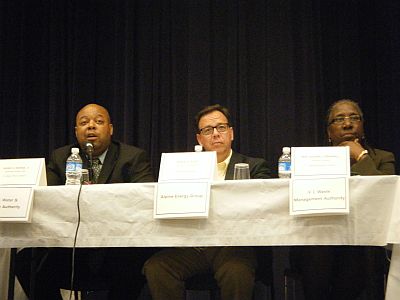
Many residents who came out for the four-hour hearing at the Charlotte Amalie High School auditorium went straight to the point, asking Alpine and government representatives for assurances that the project will not have long-lasting health or environmental impacts on the territory.
Just a few residents were openly hostile, attacking Alpine representatives by saying they were only in the territory to make a profit and would leave as soon as the dust started to settle. Most, however, said their main concern was that the deal was being "pushed" and "shoved" down the people’s throats by government officials playing on the fear that the territory’s livelihood — it’s tourism industry — would be negatively impacted if the deal was held up.
There are still many questions, residents said, and there should be no rush to construct the plants until all the issues are addressed.
"All we’re asking for is honesty," said St. Thomas resident Stephanie Scott-Williams. "Will this affect our quality of life?"
But on the government side, officials from the Waste Management Authority and WAPA said the deal with Alpine was the most effective way of solving the territory’s waste issues and cutting its dependence on fossil fuel.
"I don’t see this as a rush decision," WMA Executive Director May Adams-Cornwall said. "The waste issue here has been ignored for years — now it’s time to act."
She said WMA has involved the community in the process from the beginning, putting together citizen advisory groups that she said had recognized the potential of having waste-to-energy plants in the territory. Further, built into the authority’s contract with Alpine is a clause that allows for the hiring of what was described as a community watchdog, responsible for keeping tabs on the plant and reporting on its operations.
The position, which will be paid for by Alpine, will be independent of the company and the government, and could be filled by a community activist or public citizen, Adams-Cornwall said.
The environmental concerns centered upon the use of pet coke as a supplemental fuel for the plant, which will first burn waste and other alternative fuels — such as biomass, scrap tires and sludge — and how much it will cost the authority.
Pet coke will account for about 76 to 80 percent of the fuel mix at the St. Thomas facility and 60 to 64 percent at the St. Croix facility, WAPA Executive Director Hugo Hodge Jr. said Tuesday.
While Hodge said pet coke is one-tenth the cost of fuel — which he said would "significantly" reduce the authority’s fuel costs — representatives from Alpine said the project has to pass a number of environmental tests before it can get the required permits from the U.S. Environmental Protection Agency.
That process is long and complex, and for good reason — so the company and the regulatory agency can hash out all the concerns and make one environmentally sound facility, said Andy Hickson, Alpine’s environmental permits director.
When asked why one EPA official has described Alpine’s permit application as "grossly deficient," Hickson said the company has been consistently submitting information since the fall of 2009, but will have to conduct its own air-quality analysis since much of the data currently does not exist in the territory.
The permits are also contingent on the Legislature’s approval of a lease for land needed to house the facility on St. Thomas and from the V.I. Port Authority for land on St. Croix.
But Alpine’s 20-year power purchase agreement with WAPA includes stipulations that require Alpine to submit all of its environmental information and secure its permits in a timely manner, and if that doesn’t happen, the company will be subject to liquidated damages. At that time, WAPA can also choose to terminate the contract, said Michael Lukey, an environmental consultant for WAPA.
Many residents wanted to get a clear picture of how much they will be saving on their monthly WAPA bills once the facilities come online, and laughed when Hodge said $10 to $15 dollars for consumers using about 200 or 300 kilowatt hours.
"That’s not going to do much," said St. Thomas resident Clifford Callwood.
"Well, it’s a start," Hodge responded.
Hodge added that bringing in Alpine would allow for future alternative energy sources — such as wind and solar — to connect to the authority’s grid, which would further lower residents’ bills. Wind and solar can’t be used right away, because there’s no guarantee that enough energy will be produced daily to cover the base load, he explained.
Meanwhile, some residents did come prepared with solutions, including shipping the pelletized trash processed by the waste facilities to Puerto Rico, or tapping into the geothermal energy plant proposed by Wintdots, a limited liability company owned by the Elskoe family, which is in the process of securing the financing needed for its Flagberry Hill development on St. Thomas.
Alpine, WMA and WAPA officials will answer more questions on the project when they appear before the Senate Committee on Economic Development, Energy and Technology Wednesday at 9 a.m. at the Earle B. Ottley Legislative Hall on St. Thomas.





